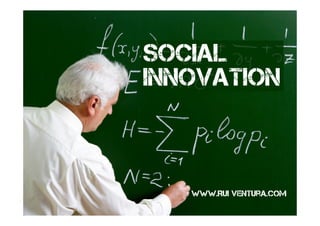
Social Innovation
- 1. SOCIAL INNOVATION www.Rui ventura.com
- 3. Liberté Égalité Fraternité La Liberté guidant le peuple – 1830 E.Delacroix
- 5. la Liberté éclairant le monde - 1886 F. Bartholdi
- 6. Industrialism An economic and social system based on the development of large-scale industries and marked by the production of large quantities of inexpensive manufactured goods and the concentration of employment in urban factories.
- 7. Globalization describes an ongoing process by which regional economies, societies, and cultures have become integrated through a globe-spanning network of communication and execution. The term is sometimes used to refer specifically to economic globalization: the integration of national economies into the international economy through trade, foreign direct investment, capital flows, migration, and the spread of technology
- 10. “I’ll keep it short and sweet: Family. Religion. Friendship. These are the 3 demons you must slay if you wish to succeed in Business.” Mr.Burns
- 14. Until the system fails... Everything was perfect...
- 15. The First doubts
- 16. The confirmation
- 17. The confirmation
- 18. The confirmation
- 19. Banksy, West Bank, Palestine
- 20. There’s hope
- 21. A recent Time Magazine cover story, “The New Frugality,” suggests the recession has changed our perspective – not just for the short term, but for the long term. Suddenly, Americans are saving again. We’re eating at home with our families more. We’re being more thoughtful about how we spend. In the process, we have a chance to change bad financial habits and to reconnect with the people and things that matter. Depending on how you approach it, a setback can leave you better – or it can leave you bitter.
- 22. frugal characterized by or reflecting economy in the use of resources. frugality acquiring goods and services in a restrained manner, and resourcefully using already owned economic goods and services, to achieve a longer term goal.
- 23. Are we ?
- 25. Vs.
- 26. Capitalism is more social Conscious capitalism
- 27. Entering a Social economy: Community Education Health Environment Human rights Tackling socialproblems Sharing knowledge
- 32. "We want to attract and nurture new talent that will develop models, methods and tools for social innovation."
- 35. Social Innovation eXchange Innovation Networks for TESE (Portugal) Ashoka (US) Communities (US) New Schools Venture Fund (US) TED (US) CCCPE (China) Hope Institute (S.Korea) Tallberg Forum (Sweden) Mindlab (Denmark) MaRS (Canada) REDF (US) Heategu (Estonia) SEKN (L. America) OECD Lien Foundation (Singapore) Shuttleworth Foundation (S. Africa) Civicus (Int.) Australian Centre for Social Innovation BEPA/European Commission SITRA and STAKES (Finland) Sustainable Everyday Project (Italy) World Health Organisation MIK/Mondragon (Spain) New Profit Inc (US) DIUS (UK) Fuping Development Institute Young Foundation (UK) (China) Innovation Unit (UK) Mandag Morgan (Denmark) NESTA (UK) Center for Social Innovation Kennisland (Netherlands) (Canada) Social Innovation Generator (Canada) Doors of Perception (Int.) Sciences-Po (France) Kellogg Foundation (US)
- 36. • to sustain economic growth, the Dutch won’t work harder or make longer hours, but will have to work ‘smarter’. • to develop new adequate labour relations • to embed technological innovation in social innovation.
- 37. “our time is our key economic asset” http://www.sliversoftime.com/
- 38. Empower people to sell their time in new ways
- 43. “Our mission is to Educate, Empower and promote Enjoyment”
- 44. CASE: School Of everything http://schoolofeverything.com/ http:// schoolofeverything.com/ schoolofeverything.com
- 57. http://schoolofeverything.com/ http://schoolofeverything.com/ schoolofeverything.com
- 58. http://schoolofeverything.com/ http://schoolofeverything.com/ schoolofeverything.com
- 62. "Our thriving third sector continues to find innovative ways to tackle issues. We are creating a new generation of activists, campaigners and social entrepreneurs who are showing us just how the newest of technologies can help solve some of the oldest of challenges, building a more just society and better, stronger communities." Gordon Brown
- 66. To discover what comes next, maybe we should look upwards. Skylines provide the simplest test of what a society values, and where its surpluses are controlled. A few centuries ago the greatest buildings in the world's cities were forts, churches and temples; temples then for a time they became palaces palaces. Briefly in the 19th century civic buildings, railway stations and museums overshadowed them. And then in the late 20th century everywhere they were banks Few believe that they banks. will be for much longer. But what will come next? Great leisure palaces and sports stadiums; universities and art galleries; water towers and hanging gardens; or perhaps biotech empires? We need to rekindle our capacity to imagine and to see through the still-gathering imagine, still- beyond. storm to what lies beyond Geoff Mulgan
- 67. “A Crisis is a Terriible Thing to Waste.”
- 68. SOCIAL INNOVATION www.Rui ventura.com
